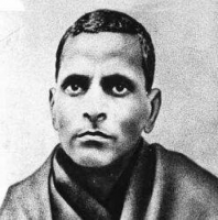Hunger strikes, fasting unto death and other synonymous threats have been and continue to be a frequent recourse in India for people fighting for a cause. Recent history has seen activists such as Kisan "Anna" Hazare and Irom Sharmila using it as an effective tool. Their relative success has sparked a number of other fasts which are often hackneyed attempts at garnering cheap publicity.
While many fast-unto-death's are ended voluntarily once a goal has been reached or a compromise has been negotiated (Hazare's fast lasted "only" 98 hours), other less populist attempts such as Sharmila's are dealt with by the government by charging the activist with "an attempt to commit suicide" and subsequently force-feeding him or her. However, there have been a few occasions where the threat to fast until death has been carried out to its final, gruesome end:
- Vasudev Balwant Phadke: An armed revolutionary who fought for India's independence in the 1870s, Phadke was eventually betrayed, captured, and imprisoned. Later transferred to a jail in Aden, he undertook a fast unto death in protest of the inhumane treatment being meted out to him. He expired on February 17, 1883 at the age of 37.
- Jatindra Nath Das: In June of 1929, Jatin Das was arrested in Kolkata as one of the accused in the "Supplementary Lahore Conspiracy Case". While in jail in Lahore, the 24 year old Das embarked on an indefinite hunger strike in protest against the mistreatment of Indian prisoners and the preferential treatment being meted out to British offenders. Despite efforts by the prison authorities to force-feed him or otherwise end his fast, he sustained it for 63 days until his death on the 13th of September.
- Potti Sreeramulu: In a bid to protect the interests of the Telugu speaking people of South India, Potti Sreeramulu set about on a fast on October 19, 1952. Contrary to the wishes of the Centre which did not want the country to be divvied up on linguistic lines, he wanted the new state of Andhra to be carved out of the Madras Presidency with Madras/Chennai as its capital. The 51 year old Sreeramulu's fast lasted 58 days until his death on December 16. A few days later, Jawaharlal Nehru announced that a separate Andhra state would be created.
- Swaroopam Kumar Girish / Swami Nigamananda Saraswati: To protest against illegal mining and the pollution of the river Ganga, Nigamananda went on a fast on February the 19th, 2011. His fast lasted 67 days until April the 27th when he was rushed to a hospital. The 34 year old eventually expired on June 13.

